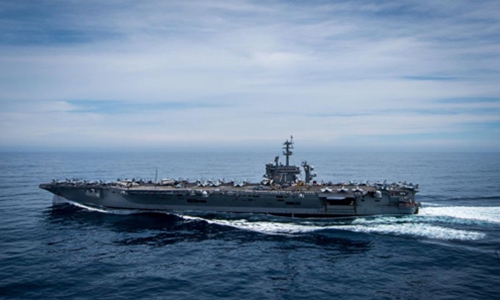Rare gathering of US aircraft carriers 'to be met with Chinese countermeasures'
By Liu Xuanzun Source:Global Times Published: 2020/6/14 17:48:40

USS Theodore Roosevelt transits the Pacific Ocean on April 7, 2017. Photo: US Navy
In a rare move, the US is sending three aircraft carriers to waters near China as bilateral tensions rise, a move interpreted by foreign media as a warning to China. Chinese military experts said on Sunday that the US move again exposed its hegemonic politics in the region, and China could counter it by holding military drills and showing its ability and determination to safeguard its territorial integrity.
China possesses aircraft carrier killer weapons like the DF-21D and DF-26 anti-ship ballistic missiles.
The three US aircraft carriers, namely the USS Theodore Roosevelt, USS Nimitz and USS Ronald Reagan, together with other US naval warships and aircraft, are patrolling the Indo-Pacific waters, the Associated Press reported on Friday.
It has been nearly three years since so many US aircraft carriers have been simultaneously deployed in the region, the report said, noting this move comes as tensions between China and the US are rising over topics like COVID-19, Hong Kong's national security law and the South China Sea.
All three aircraft carriers were hit by the COVID-19 pandemic, which left the US with no aircraft carriers in the western Pacific region for more than two months.
By massing these aircraft carriers, the US is attempting to demonstrate to the whole region and even the world that it remains the most powerful naval force, as they could enter the South China Sea and threaten Chinese troops on the Xisha and Nansha islands as well as vessels passing through nearby waters, so the US could carry out its hegemonic politics, Li Jie, a Beijing-based naval expert, told the Global Times.
China could counter the US move by enhancing its own war preparedness and holding corresponding drills, telling the US that China is capable of and determined to safeguard its territorial integrity, Li said.
Naval and aerial forces of the Chinese People's Liberation Army (PLA) have expelled many US warships that illegally entered China's territorial waters off the Xisha and Nansha islands in the South China Sea this year, according to PLA statements.
In addition to standard naval warships, aircraft and missiles, China possesses a wide range of weapons designed to sink aircraft carriers, like the medium-range anti-ship ballistic missile DF-21D that can cover the First Island Chain, and the intermediate range anti-ship ballistic missile DF-26 that can reach Guam. These missiles can attack medium-sized to large surface vessels from above at very high speeds, making them difficult to intercept, according to publicly available information.
Li also cast doubt over US aircraft carrier's combat readiness after their crews' recovery from the epidemic.
Just as US President Donald Trump is pushing for domestic work resumption, the aircraft carriers were also pushed to the frontlines, Li said, noting that the US military only cares whether they are deployed rather than if they are ready to fight.
"In this situation, it is also possible that another COVID-19 outbreak will take place on the US carriers," Li said.
Posted in: MILITARY